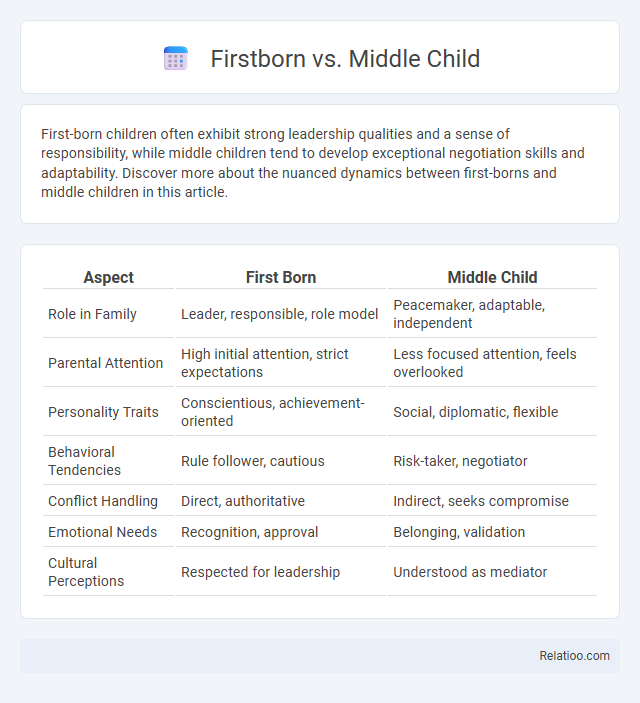First-born children often exhibit strong leadership qualities and a sense of responsibility, while middle children tend to develop exceptional negotiation skills and adaptability. Discover more about the nuanced dynamics between first-borns and middle children in this article.
Table of Comparison
| Aspect | First Born | Middle Child |
|---|---|---|
| Role in Family | Leader, responsible, role model | Peacemaker, adaptable, independent |
| Parental Attention | High initial attention, strict expectations | Less focused attention, feels overlooked |
| Personality Traits | Conscientious, achievement-oriented | Social, diplomatic, flexible |
| Behavioral Tendencies | Rule follower, cautious | Risk-taker, negotiator |
| Conflict Handling | Direct, authoritative | Indirect, seeks compromise |
| Emotional Needs | Recognition, approval | Belonging, validation |
| Cultural Perceptions | Respected for leadership | Understood as mediator |
Understanding the Birth Order Theory
Birth order theory examines how being a first born, middle child, or youngest influences personality traits and behavior patterns due to unique family dynamics and parental attention. First born children often develop leadership skills and a sense of responsibility, while middle children may become peacemakers and adaptable, navigating between older and younger siblings. Understanding these distinctions highlights the psychological impact birth order has on individual development and family interactions.
Key Personality Traits of First Borns
First born children typically exhibit leadership qualities, responsibility, and a strong sense of achievement due to their role as the initial family influencer. They often develop a perfectionist mindset and strive for approval, driven by high parental expectations and the absence of older siblings. Birth order psychology highlights that first borns are usually more conscientious and organized compared to middle children, who are often more diplomatic and social.
Distinctive Characteristics of Middle Children
Middle children often develop strong negotiation skills and become adept at diplomacy due to their position between older and younger siblings. They tend to be more independent and flexible, carving out unique identities away from the typical expectations placed on first borns and youngest siblings. Research indicates middle children may exhibit higher social intelligence and adaptability, making them effective mediators within family and social dynamics.
Academic Performance: First Born vs Middle Child
First born children typically demonstrate higher academic performance due to increased parental attention and expectations compared to middle children, who often receive less focused support. Studies show first borns generally achieve better grades and standardized test scores, benefiting from a structured home environment and leadership roles within the family. Middle children may develop social skills to compensate but often face challenges in academic achievement relative to their elder siblings.
Social Skills and Friendships
First born children often develop strong leadership qualities and responsibility, which enhance their social skills and ability to form meaningful friendships. Middle children typically excel in negotiation and diplomacy, making them adept at maintaining friendships and navigating social dynamics. Understanding how Your birth order influences these traits can help you leverage strengths in building and sustaining social connections.
Leadership and Responsibility
First born children often develop strong leadership skills and a heightened sense of responsibility due to their role as the family's initial achiever and role model. Middle children may exhibit adaptive leadership qualities and diplomatic skills, balancing responsibilities between older and younger siblings without the intense pressure first borns face. Your birth order can influence how you approach leadership and responsibility, shaping your ability to manage tasks and guide others effectively.
Sibling Rivalry and Family Dynamics
Sibling rivalry often intensifies depending on birth order, with first born children typically experiencing pressure to set an example and middle children navigating feelings of neglect or invisibility. Middle children may develop strong negotiation skills to balance family dynamics, while first borns might feel rivalry stems from defending their established role in the family hierarchy. Understanding your birth order helps in identifying patterns of competition and collaboration, fostering healthier relationships among siblings.
Impact on Career Choices
First born children often exhibit leadership tendencies and a strong sense of responsibility, which influence their preference for careers in management, law, or medicine. Middle children typically develop negotiation skills and adaptability, making them well-suited for roles in sales, diplomacy, or creative fields. Birth order shapes personality traits that affect career decisions, with last-borns showing risk-taking and social skills that align with entrepreneurial or artistic professions.
Parenting Styles and Their Effects
Parenting styles significantly influence the development of first born, middle, and later-born children, shaping their personalities and behaviors according to their birth order. First born children often experience authoritative parenting, fostering leadership skills and responsibility, while middle children may receive more relaxed or democratic styles that encourage adaptability and social negotiation. Understanding your child's birth order can help tailor parenting approaches to meet their unique emotional and developmental needs effectively.
Psychological Well-being and Self-Esteem
First born children often exhibit higher levels of responsibility and leadership qualities, which can positively influence their psychological well-being and self-esteem. Middle children may experience challenges with identity and recognition, sometimes leading to feelings of neglect or lower self-worth, but they also tend to develop strong negotiation and social skills. Understanding your birth order helps in recognizing specific emotional needs and strengths, allowing for better support of your mental health and personal growth.

Infographic: First Born vs Middle Child
 relatioo.com
relatioo.com